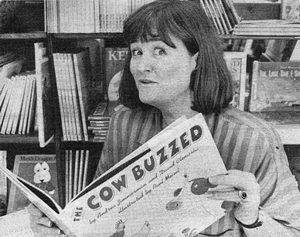ALTHOUGH HER Willow Glen children’s bookstore is mercifully free from the commercial evils of Barney overkill, Valerie Lewis doesn’t haughtily take up residence in an ivory tower. “Children should be able to gobble up anything they want to read and not necessarily be pushed into getting fine literature,” says the buoyant co-owner of Hicklebee’s.
In her own childhood, the San Jose native enjoyed devouring Nancy Drew and Mad magazine — as well as listening to her father read Charles Dickens and Dylan Thomas in a robust Welsh accent.
As children’s book consultant for CBS This Morning and co-owner of her own store, Lewis peruses thousands of children’s books a year to pick the diverse crop of the best, being careful to nurture the non-mainstream works along the way.
The San Jose State University art and English graduate has worked as an art teacher, professional storyteller and recreation supervisor. But the appeal of children’s books was irresistible to Lewis, who in 1978 opened Hicklebee’s, which features such delights as a handmade Charlotte’s Web and a tiny wooden Waldo hidden somewhere in the stacks. “I feel like this is my chance to actually add to the world,” she says.
Lewis says publishers in today’s booming field are “responding to what people want” by offering more books about the environment and kids from different cultures, as well as supporting ethnic writers and illustrators. She applauds authors’ newfound confidence in dealing with challenging subjects such as AIDS and homelessness. But, she submits, “I don’t think there’s anything better [for kids] than a good rhyme and a laugh.” After reciting from memory a bouncy passage by Lewis Carroll, she says, “I really like playful language. I’m in awe of words.”
Disturbingly, she’s witnessed a rise in the kind of censorship that attacks Charlotte’s Web for making animals seem human and lambastes The Diary of Anne Frank as being too heavy for children. Choosing her words carefully, Lewis explains, “There are groups in the country who are concentrating on what people shouldn’t read rather than what they should read.”
Books for youngsters must boast a strong story to succeed, Lewis says. “People may look at a book and say, ‘Oh, that is just beautiful, I’ve got to give that to my child,’… but that’s not necessarily the one that is going to have the most ragged edges over the years.”


